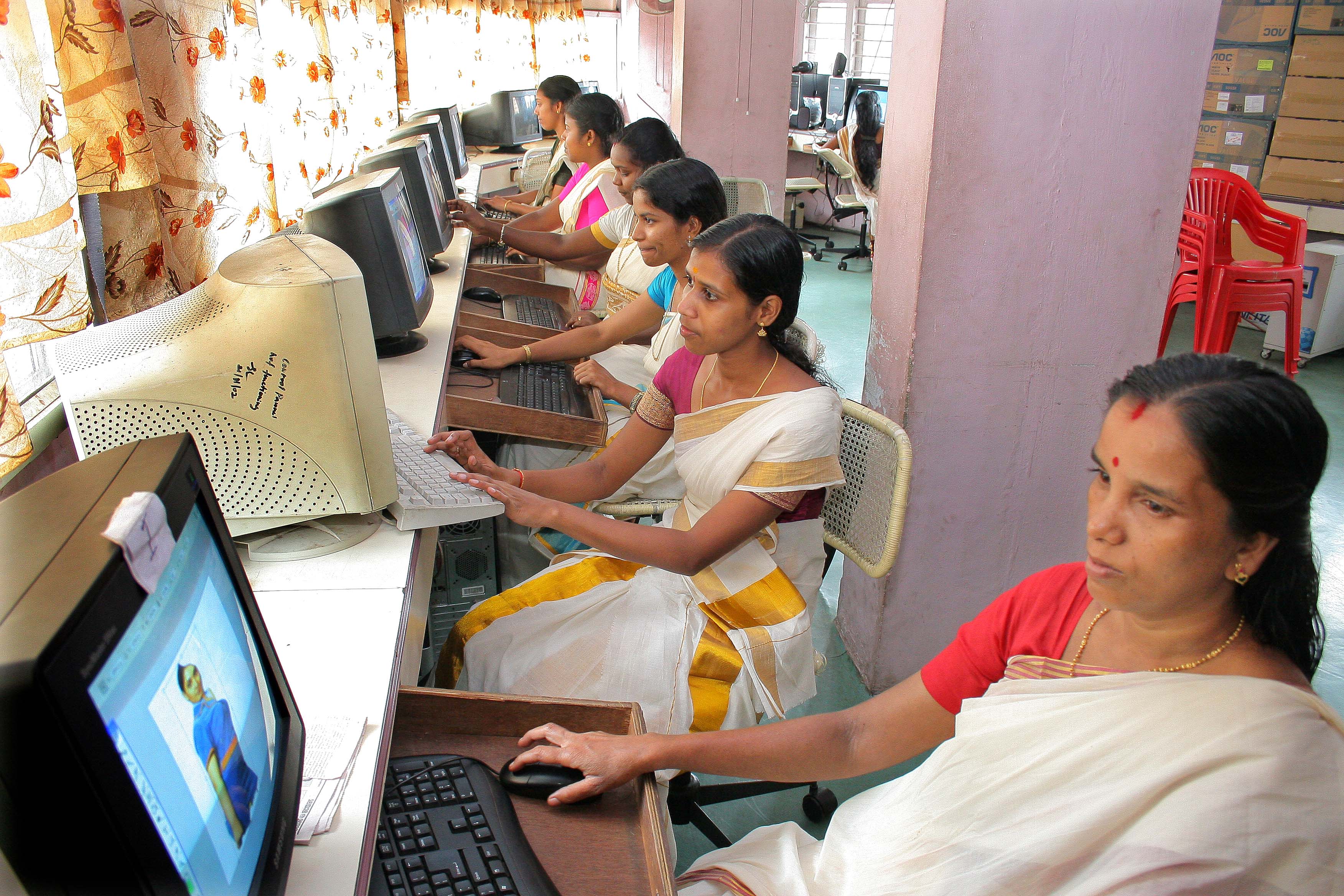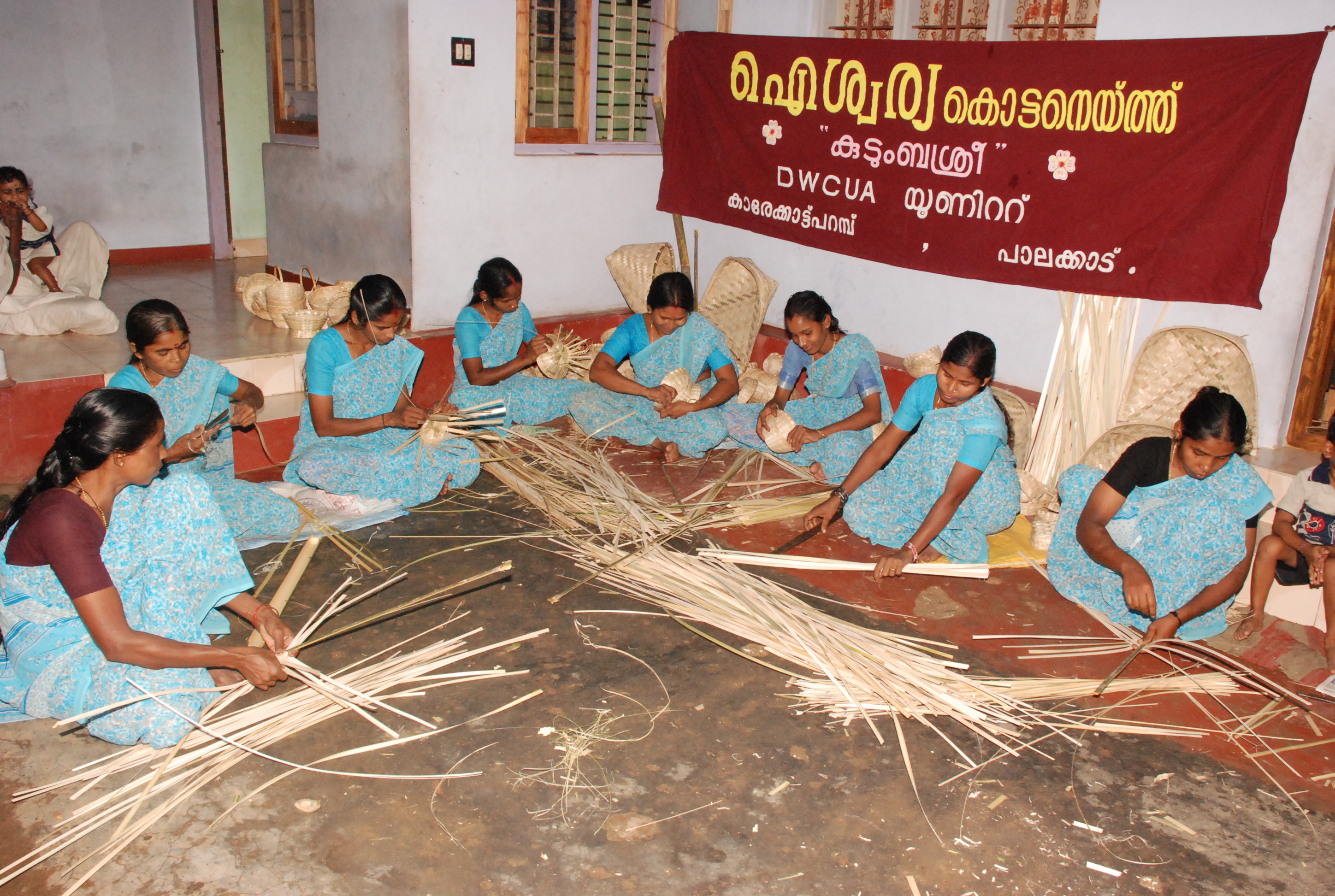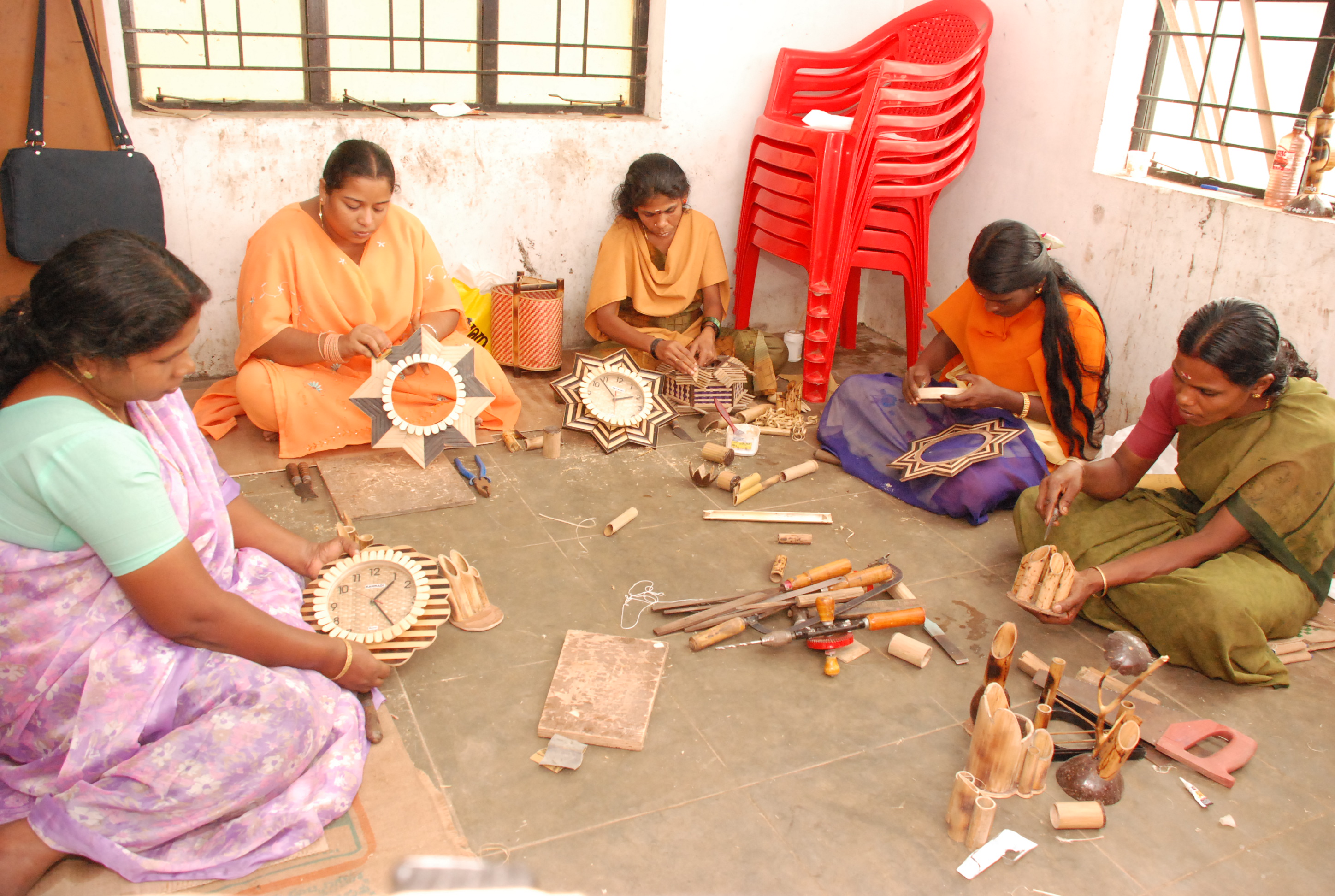While political leaders interact with voters mostly during elections, these women are actively involved with families every day and understand the difficulties of common people better as they come from poor families.
To understand how this group has come to acquire this popularity, it is instructive to hear the story of Ambika VB, who was a poor 28-year-old housewife in Kannur district in north Kerala in 2000, and thought of committing suicide when a friend refused to lend her Rs 50 to buy medicines for her sick son.
Ambika's story
In 2000, when a friend refused to lend her Rs 50 to buy medicines for her sick son, Ambika VB, 28, a poor housewife in Kannur district in north Kerala, thought of committing suicide.
Abused by her alcoholic and unemployed husband, Ambika had to shoulder the burden of bringing up her three children on her own. Her orthodox Brahmin family had ostracised her because her husband was from a so-called “backward” caste.
Thinking of her children, she eventually pulled back from the brink, selling her saree to the same friend to buy the medicines. But once the crisis was over, Ambika, confined to the four walls of her muddy house, had no idea what she could do to save her children from starving.
It was then that Ambika, who has finished high school, encountered Kudumbashree, an all-women community-based self-help initiative begun by the government of Kerala in 1998 with the objective of eliminating poverty.
Low-cost loans
Kudumbashree, which means “family prosperity” in Malayalam, gives low-cost loans to poor women so that they can start small businesses, shops or schools. The home enterprises usually involve making items for daily consumption such as chips, pickles, curry powders, fruit and vegetables, paper bags and napkins.
Kudumbashree's latest foray is into higher education by setting up community colleges. In July, in collaboration with the Mumbai-based Tata Institute for Social Sciences, it launched the first college, which offers a one-year post-graduate diploma in development praxis.
Kudumbashree has a three-tier structure: at the grassroots lies a neighbourhood group of 10 to 20 women; at the middle level, the area development society, made up of representatives elected by several neighbourhood groups; and at the top, a community development society, made up of those elected from area groups.
Al photos courtesy Kudumbashree
Escaping poverty
With the help a member of her panchayat, Ambika joined the neighbourhood group. With a loan of Rs 16,000, in three months, she had launched a door-to-door clothes business. Her friend ran a garment shop in the area and gave her clothes on credit, while members of Kudumabshree pitched in by buying from her.
The Rs 100 to Rs 200 that she earned daily was not sufficient to feed and educate the children, but the business instilled in her the confidence that she could stand on her own feet. Slowly, she shifted to making pickles, with the help of her children, who undertook packing and other tasks after they returned from school.
Along the way, she educated them. Today, her daughter, the eldest, is an assistant professor of commerce in a private college at Payyannur in Kannur; her elder son is preparing for the civil service exams after the clearing preliminary test; and the younger son, who has a masters’ degree in commerce, works in a multinational company in Saudi Arabia.
“The money was important but what I value more is the capacity I developed to face life. If it was not for the moral support I got from the organisation I would not have achieved this,” said Ambika.
She also discovered her talent for organisation. Two years after joining the neighbourhood group, she moved on to becoming president of an area development society, and a year later had become vice-president of a community development society.
Her area group was twice selected as the best in the district. She also won an award for best speaker for her speech on Kudumbashree as a poverty eradication mission on the organisation’s 14th anniversary in 2012. Ambika now works as a director of the Payyannur Cooperative Development Bank, which meets the credit needs of rural people.
Self-help
Like Ambika, thousands of women have availed themselves of these loans, set up home businesses and gradually moved up the social ladder.
The programme, which started with a few thousand women, now has 45.2 lakh members, a majority from families below the poverty line. By taking up manual and menial jobs, such as waste collection and disposal in urban centres, farming and construction, which their male counterparts refuse to do, these women are trying to give their children a better life. Kudumbashree has helped start 50,000 small enterprises, covering agriculture, construction, sanitation and even IT and communication.

Kudumbashree has significantly helped poor women raise their standard of their life, says Manjula Bharathi, an assistant professor at the Tata Institute of Social Sciences in Mumbai, who conducted a study of the initiative. Over time, it helped women graduate from being agricultural labourers to farmers, from entrepreneurial assistants to entrepreneurs, from trainees to trainers.
“The success of the programme hinges on the thrift it encourages,” said K B Vasalakumari, executive director of Kudumbashree. “The neighbourhood help groups that double up as thrift and credit societies encourage the poor to save. This helps them provide cost effective and easy credit to the members.”
Each member must contribute Rs 10 a week to a common pool, which adds up to Rs 2,100 crore a year. This is then given to members for starting businesses. The agency also facilitates bank loans, government grants and subsidies under various programmes.
Valasalakumari said that banks were keen to lend money to neighbourhood groups because its members were prompt in repaying loans. A case study on micro-credit and repayment rates conducted in four villages by D Ajit, assistant professor in economics at the University of Northern British Columbia, showed that the repayment rate was 91.3%.
Ripple effects
Kudumbashree has benefitted not just its members and their families but the state too. Its farming programme over 60,000 acres has led to resurgence in the state’s stagnant agriculture sector, reducing its dependence on other states’ for food grains, vegetables and fruits. A team of experts appointed by the Planning Commission in 2011 had hailed this agriculture initiative as a model worth emulating at the national level.
Kudumbashree members have also influenced local self-government by bringing their varied experience to local bodies. More than 5,000 members are now elected representatives in the village panchayats, municipalities and city corporations. PK Jayalakshmi, who entered politics through Kudumbashree is a state minister.
The initiative is not without some problems. The easy availability of loans has been encouraging consumerism among some poor women, said KN Harilal, an economist at the Centre for Development Studies in Thirunanthapuram.
It could lead to a debt trap and hurt the programme, he said, urging the organisation to monitor how the money is being used.












